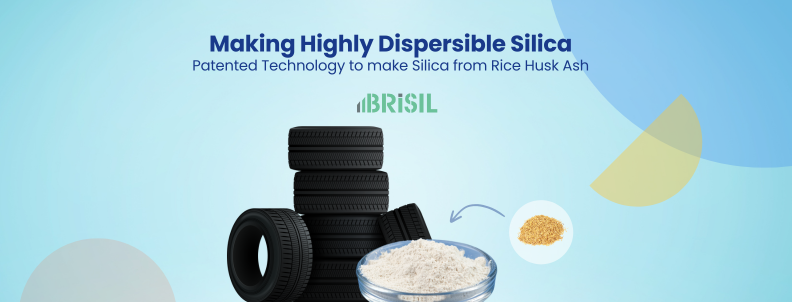Rice husk ash, a byproduct of burning rice husk for gasoline, presents a big disposal problem for industries, particularly as air pollution laws turn out to be more and more stringent. Without correct disposal strategies, this ash can contribute to environmental air pollution. Parallely, industries reminiscent of tire manufacturing are below strain to undertake greener, extra sustainable supplies to scale back carbon emissions and improve product efficiency.
Innovative startups like Brisil see these issues as alternatives to create applied sciences and merchandise that clear up each issues concurrently.
Brisil’s technology converts rice husk ash into high-value supplies like precipitated and extremely dispersible silica. This modern course of affords a sustainable resolution for rice husk ash disposal and supplies industries with eco-friendly options.
As a expertise scouting agency, we had been decided to uncover the science behind Brisil’s expertise and discover its potential impression on combating waste and sustainability challenges.
So, we spoke with Tanmay Pandya, the CEO of Brisil, to realize precious insights about how the startup is upcycling danger husk ash to fabricate Highly Dispersible Silica (HDS).
Author’s be aware: While researching, we discovered many different startups upcycling waste into green chemicals. Click on the hyperlink to study extra about them.
“There is a push towards sustainability, so many big customer wants to move to a product which can help them reduce their carbon emissions or improve their ESG report cards.”
– Tanmay Pandya

Tanmay Pandya is the Founder and Director of Brisil Technologies. Before this, he co-founded Bridgedots, a cleantech startup, and labored as its Director for five+ years. He accomplished his B.Tech in Chemical Engineering from the Indian Institute of Technology.
Want to know extra about Brisil’s HDS expertise? Watch our dialog with Tanmay.
Overview: Brisil Utilizing Rice Husk Ash to Create Precipitated Silica and HDS
Brisil is a pioneering firm targeted on fixing the numerous problem of rice husk ash disposal by reworking this agricultural byproduct into high-value supplies like precipitated silica and HDS.
Utilizing its patented expertise, Brisil converts rice husk ash into important materials. These supplies have been efficiently commercialized and have purposes in tires, rubber, toothpaste, paints, and plastics.
The extremely dispersible silica produced by Brisil is especially precious as a filler in energy-efficient inexperienced tires. It enhances car mileage and reduces greenhouse gasoline emissions. The firm’s expertise is acknowledged as some of the superior in silica manufacturing.
“In the startup journey, you always get such developments that keep you hopeful about the prospects… because for any idea or business to become big, there has to be a big market and big customers.”
– Tanmay Pandya
Short on time?
Here are key highlights from the dialogue.
Highlights from The Conversation
How did you give you the thought to start out the corporate?
The concept behind Brisil got here from a singular drawback a big energy technology firm offered to us. They used rice husk to generate electrical energy, however the course of resulted in a big quantity of ash, which they’d no use for. They approached us to develop a expertise that might make the most of this ash, which they believed had good market potential.
As we delved into the issue, we realized that this ash disposal problem was not small however reasonably a widespread problem. We additionally found that the silica extracted from this ash could possibly be precious, notably within the tire and rubber industries.
When we offered this concept to a high government from a number one tire firm, he confirmed its potential if correctly developed and commercialized. That was our ‘aha’ second—realizing that we may deal with each the ash disposal drawback and meet the numerous demand for silica out there.
What your product — Highly Dispersible Silica (HDS), means, and why it’s higher than common silica, notably within the tire trade?
Silica has been used within the tire trade for many years, and over time, the standard of silica has improved to exchange carbon black in tires. Highly dispersible silica (HDS) is a sophisticated grade of silica with superior dispersion properties.
HDS disperses extra evenly when combined with rubber than common silica, permitting for the next silica content material with out compromising the rubber’s properties. This leads to higher tire efficiency, which is essential for contemporary purposes.
If a tire producer is contemplating switching to HDS, how do you justify the fee in comparison with common silica?
One key benefit of our HDS is that it’s derived from rice husk ash, a biosource, reasonably than from sand, which is usually used. This leads to considerably decrease carbon emissions—about 70% lower than common silica.
As sustainability turns into a precedence, many shoppers see the worth in lowering their carbon footprint and enhancing their ESG scores.
Additionally, our silica can immediately exchange common silica in current processes with out requiring modifications in logistics or provide chains, which makes the change extra seamless and cost-effective in the long term.
How did you handle the sourcing of rice husk ash, particularly because it’s a decentralized materials? Do you foresee challenges as demand grows?
We did intensive analysis earlier than beginning to guarantee a gentle ash provide. Currently, we’ve long-term contracts with corporations producing massive portions of ash, securing our provide for current and future operations.
We’re additionally making ready for the longer term, understanding that as ash turns into extra precious, competitors for it would enhance. We’re participating in long-term partnerships and investments to make sure a steady provide as we scale up.
How do you resolve which merchandise to develop subsequent?
We have a look at two issues: first, what merchandise may be derived from our current course of with minimal modifications, and second, what different precious chemical substances may be extracted from various kinds of biomass waste. We consider the market potential for these merchandise and prioritize these with the very best demand and feasibility.
What’s your technique behind submitting patents?
We have each Indian and US patents. The US patent, specifically, is extremely revered globally and provides us a powerful place out there.
While submitting patents in each nation is expensive, securing a US patent supplies broad safety and credibility. Knowing that our expertise is novel and legally protected is reassuring for our clients and traders.
Want to be featured in Scouted by GreyB? Join a dialog with our specialists and showcase your groundbreaking expertise.
Book your slot at this time!
Meet our Interviewer – Vikas Jha, AVP, Solutions at GreyB

Vikas Jha is an skilled tech guide targeted on mental property consulting. With experience in numerous domains like Telecom, Navigation, and Medical Devices, he helps purchasers navigate innovation challenges. His potential to bridge expertise, innovation, and management makes him a precious useful resource within the evolving tech panorama. Vikas has been featured on CNBC for his insights on next-gen applied sciences like area tech.
Take a look at other startups scouted by GreyB!
Authored By: Naveen Kumar, Marketing
Next Read: 5 Bioplastics Startups to Solving Waste and Pollution Problems
Brisil’s Patented Technology Making Highly Dispersible Silica from Rice Husk Ash – Insights from Tanmay Pandya, CEO2024-08-312024-09-02https://www.greyb.com/wp-content/uploads/2019/12/greyb.gifGreyBhttps://www.greyb.com/wp-content/uploads/2024/08/making-highly-dispersible-silica-patented-technology-to-make-silica-from-rice-husk-ash-1.png200px200px
